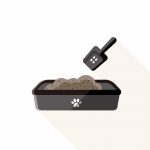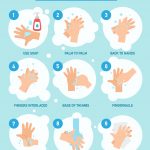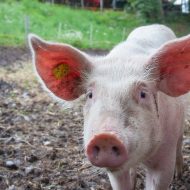Toxoplasmosis
Toxoplasmosis is caused by a parasite* called Toxoplasma gondii. Most healthy people will show no signs or very few signs of sickness.
Overview
How can I get sick?
- Eating undercooked* meat (typically pork, lamb and venison) or shellfish (oysters, clams, or mussels) that has the parasite*.
- Touching raw meat or shellfish that has the parasite on it and then touching other foods without washing your hands.
- Drinking water that has the parasite* in it.
- Touching cat poop and accidentally getting the parasite in your mouth when doing the following:
- Cleaning a cat’s litter box that has the parasite* in the cat poop.

- Touching or eating anything that has come in contact with infected cat poop.
- Accidentally eating dirt that has the parasite* in it such as from a garden or eating unwashed fruits or vegetables.
- Mother to child transmission (congenital transmission)
Symptoms in humans:
Some people may show no signs of sickness and others may have the following:
- Flu like symptoms
- Fever (when your body gets a little hotter than normal)
- Cough
- Sore throat
- Body pain
- Fever (when your body gets a little hotter than normal)
- Muscle pains
- Babies who are infected while in the belly (womb) of the mother will have no symptoms at birth, but symptoms may develop later in life.
What can I do to stay healthy?
- Make sure that beef, pork, chicken, and shellfish (oysters, clams or mussels) are cooked to the proper internal cooking temperature.

- Wash all vegetables and fruits properly before eating.
- Wash items used for cooking and surfaces that could have parasites from raw meat shellfish, or unwashed produce.
- Do not eat raw or undercooked* oysters, mussels, or clams.
- Do not drink untreated water such as from a creek or river.
- Wear gloves when gardening and wash hands after gardening or touching dirt.
- Proper Handwashing – Wash your hands with soap and running water for at least 20 seconds. Make sure to scrub your thumbs, between your fingers and the tops and bottoms of your hands. Dry your hands with a paper towel.

- Keep outdoor sandboxes covered when not being used to keep pets out.

- Do not feed cats raw food.
- Change cat litter boxes daily. ALWAYS properly wash your hands with soap and water after cleaning a cat’s litter box.
- If you are pregnant or have other illnesses, do not clean cat litter boxes.

Pregnancy and Toxoplasmosis FAQs:
If someone is newly infected with Toxoplasma while they are pregnant, or just before pregnancy, then they can pass the infection on to their baby. Many do not have any symptoms from the infection and most infected babies do not have symptoms at birth but can develop serious symptoms later in life, such as blindness or mental disability.
- If you are pregnant, avoid changing cat litter if possible.
- If there is nobody else to change cat litter, make sure to wear disposable gloves and always wash your hands with soap and water after.
- Make sure that cat litter boxes are changed daily.
- Feed your cat commercial dry or canned food. Do not feed them raw or undercooked meats.
- Keep cats indoors.
- Avoid stray cats, especially kittens. Do not get a new cat while you are pregnant.
- Properly wash your hands with soap and water before and after you feed or change your baby.
- If you are concerned about toxoplasmosis, please contact your healthcare provider for testing and more preventative information.
*Definitions:
- Parasite: A parasite is an organism that lives on or inside another organism, called a host. Parasites can cause diseases in humans or animals.
- Undercooked: Cooking food less than the recommended time or temperature.
Species Affected

Learn About Other Diseases
Click below to learn more about the many different diseases that can spread between animals and humans.
Diseases



